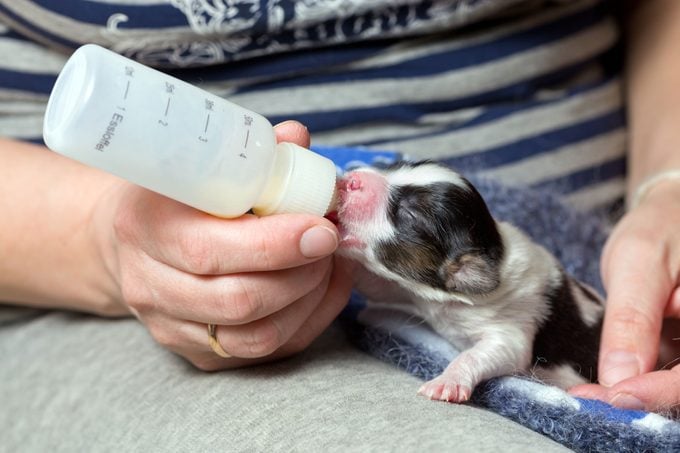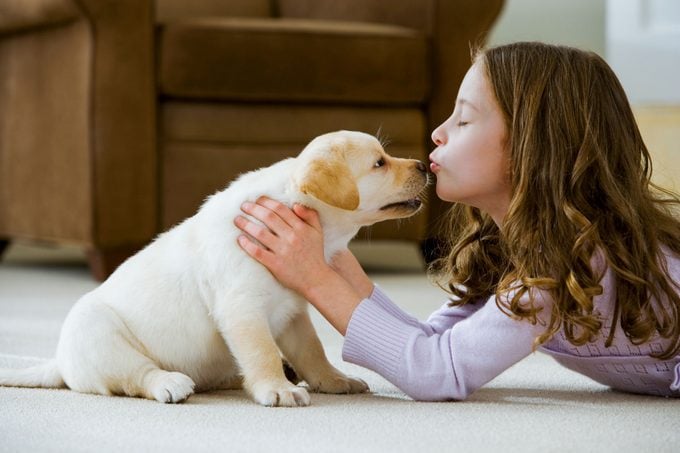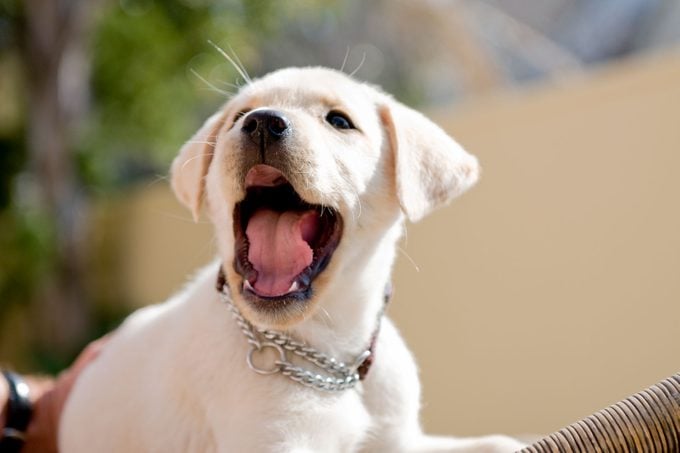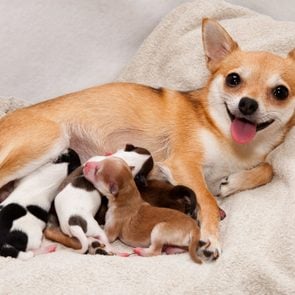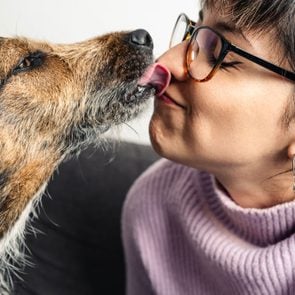3 Reasons Why Puppy Breath Smells So Good
Updated: Apr. 10, 2024
Sweet puppy breath is a fleeting joy. But what causes it and how long can you expect it to stick around?
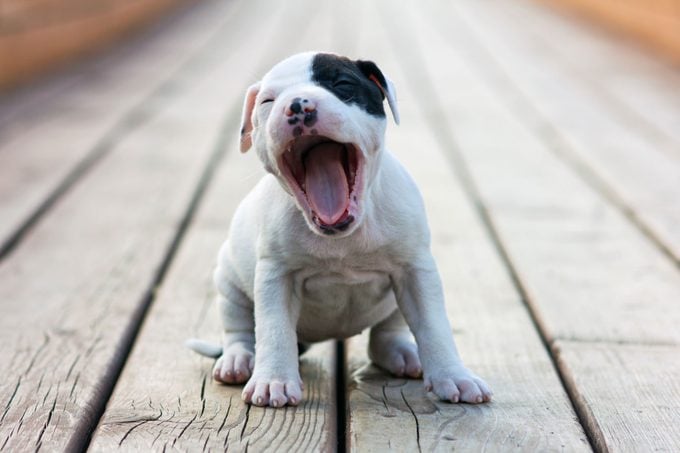
Being adorable is in a puppy’s best interests. Raising babies (of any species) is hard work, so nature has pulled out all the stops to prevent parents from putting their own needs first. Those big heads, round eyes, plump little bodies and puppy breath (oh, the puppy breath!) are all reasons why we can so easily overlook a puppy’s more challenging dog behaviors—as anyone who has had a favorite shoe chewed up by a teething pup can attest to.
But what is puppy breath and why does it smell so good? There hasn’t been any research on the subject, but as a veterinarian with more than 25 years of experience, I have ideas. After all, it’s natural for us to wonder about one of the few good smells associated with our work. Ahead, I’m explaining everything we know about this oral hygiene phenomenon.
Get Reader’s Digest’s Read Up newsletter for more pets, cleaning, humor, travel, tech and fun facts all week long.
About the expert
Reviewed for accuracy by: Amy Attas, VMD, an award-winning veterinarian, the founder of City Pets and the author of Pets and the City: True Tales of a Manhattan House Call Veterinarian. |
What is puppy breath?
Some veterinarians say puppy breath has overtones of honey, vanilla or sweetened yogurt. This last description gives us a clue about one of the primary theories behind puppy breath.
Diet
When puppies are very young, they eat and drink nothing but their mother’s milk or puppy milk replacer. Milk is broken down by specific enzymes in a puppy’s digestive tract so that it can be absorbed and used by the body. Certain types of bacteria that thrive in a milk-rich environment are also present in the pup’s digestive tract at this time. The breakdown products of milk digestion and the gasses that these bacteria produce have an odor that is unique to this stage of a dog’s life.
Most puppies start eating some solid food when they are around a month old and are taking in very little milk by the time they are 6 to 8 weeks of age. However, their puppy breath doesn’t immediately disappear because it takes time for their digestive tract to adapt to the new diet.
Immature bodies
Add to their unique diet the fact that puppies are still maturing. The valves that keep the contents of the intestinal tract moving forward aren’t fully developed yet, which makes it easier for gas that is swallowed or produced in the intestinal tract to escape out the mouth. Anyone who has burped a baby knows how much gas (and sometimes milk) a little one can bring up.
Clean teeth
Puppies also usually have very healthy teeth and gums. They haven’t yet developed the plaque, tartar and periodontal disease that often leads to bad breath in adult dogs.
What age (and why) does puppy breath go away?
Unfortunately, puppy breath tends to go away when pups are still quite young—usually when they are between two and three months of age. The clock is ticking once they are eating mostly puppy food. Their digestive enzymes and bacteria populations will gradually shift to what is more appropriate for their new diet, and this will create new smells.
Teething also plays a role. A puppy’s baby teeth usually start to fall out and are replaced by their adult teeth when they are around 3 months old. This process involves the breakdown of the tissues that support baby teeth and some bleeding, which can lead to an unpleasant, slightly metallic smell that overwhelms any puppy breath that may still be present. Teething ends by the time a puppy is 6 months old or so, at which point their puppy breath is long gone.
How to keep your puppy’s breath smelling fresh
It’s inevitable that a puppy’s breath will eventually lose its hypnotic appeal. However, pet parents have a lot of control over keeping their dog’s mouth healthy and breath smelling good.
Brush your puppy’s teeth
Brushing your dog’s teeth using a soft bristle toothbrush and a toothpaste designed for pets is by far the best way to keep their breath smelling fresh. Learn how to clean your dog’s teeth. Start when your new pup arrives home, but go slowly and follow these guidelines.
- First, get them used to you handling their face, lifting their gums and touching their teeth.
- Then, put a little pet toothpaste on a soft toothbrush and let them lick it off so they can get used to the flavor of the toothpaste and the feel of the brush.
- Finally, brush just a few teeth. Gradually increase the amount of time you are brushing until your pup will allow you to brush the outside of all of their teeth in about 30 seconds.
Brushing your dog’s teeth every day will eliminate plaque before it has a chance to harden into tartar. Missing a day here and there won’t do any harm, but if you brush your pup’s teeth less than every other day, you aren’t doing them much good.
Use dental-care products
Dog dental-care products that will help your pup’s breath stay fresh are available at most pet supply stores. They’re best used as a supplement to (rather than a replacement for) regularly brushing your dog’s teeth, but they will help a little if toothbrushing isn’t a realistic option for you.
Products that carry the Veterinary Oral Health Care (VOHC) seal have been shown to slow the buildup of plaque and tartar on teeth. Options include:
- Dental diets
- Rawhide chews
- Edible chew treats
- Water additives
- Oral gels
- Wipes
- Sprays
Visit your veterinarian
Your veterinarian will check your pup’s teeth and gums every time they perform a physical examination. When they start seeing tartar and gingivitis, they will recommend a professional dental cleaning. Professional cleaning of a dog’s teeth is similar to what happens during a human’s teeth cleaning at the dentist’s office, but dogs have to be anesthetized so that nobody gets hurt and the dogs don’t inhale bacteria water and other things that could make them sick.
Take a whiff the next time your dog licks you. The sweet smell of puppy breath is in direct contrast to the odors associated with periodontal disease and other health problems that can affect a dog’s mouth. Talk to your veterinarian if you have questions about your dog’s well-being.
Why trust us
At Reader’s Digest, we’re committed to producing high-quality content by writers with expertise and experience in their field in consultation with relevant, qualified experts. For this piece, Jennifer Coates, DVM, tapped her experience as a veterinarian with more than 25 years of experience, and then veterinarian Amy Attas, VMD, founder of City Pets and author of Pets and the City: True Tales of a Manhattan House Call Veterinarian, gave it a rigorous review to ensure that all information is accurate and offers the best possible advice to readers. We verify all facts and data, back them with credible sourcing and revisit them over time to ensure they remain accurate and up to date. Read more about our team, our contributors and our editorial policies.
Sources:
- U.S. Department of Agriculture: “Canine Periodontal Disease”
- Veterinary Oral Health Council: “Accepted Products for Dogs”

